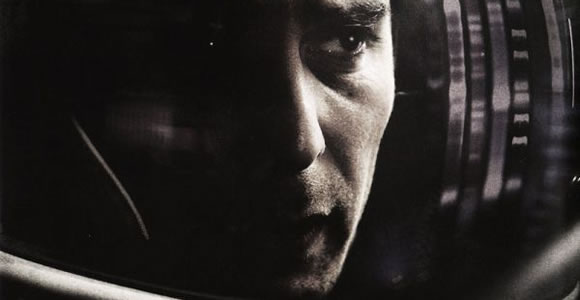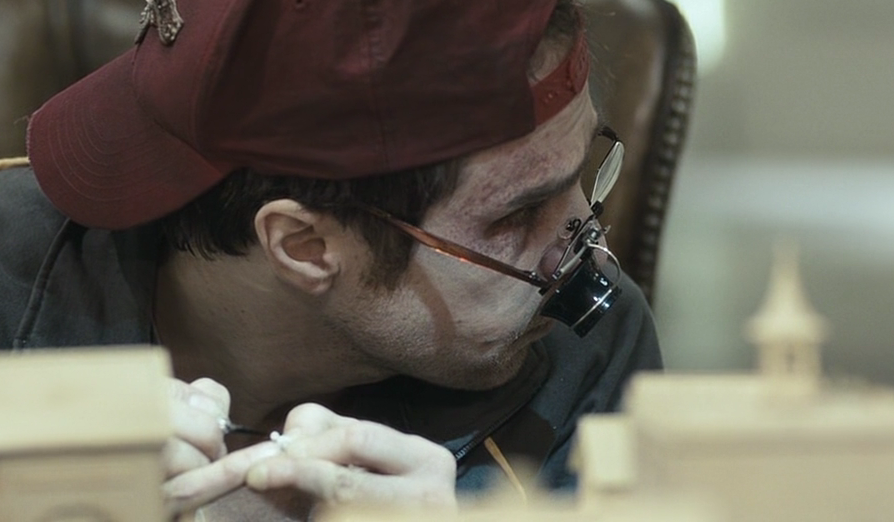Today’s post on ‘Rogue Cinema’ is a collaboration between Matt and Andy.
“WHERE ARE WE NOW?”
If you’ve seen 2001: A Space Odyssey you’ll find many similarities between the mood, the sets, the characters, the landscapes and even the plot devices found in Moon; so much so that this film from 2009 is virtually a tribute and grungy satire of Stanley Kubrick’s 1968 epic sci-fi symphony. Moon is Radio Head’s ‘Creep‘ to 2001‘s triumphant ‘Also Sprach Zarathrustra‘. Where 2001 looks at human evolution and finds an animal in conversation with the divine and bound for . . . godhood? Moon peers into the same place and finds an animal in conversation with itself and bound for . . . madness? Both are shocking revelations and profound mirrors on the human mind. Both films are better for the association.

In the beginning, Moon shows us a man: bored. After almost three years isolated on a moon base, this man (Sam) is desperate to return home to his wife, and experience the human connection he longs for. In the last two weeks on the base, however, he must continue with his routine maintenance tasks, and the little hobbies he engages in to try to maintain his sanity: tending for potted plants, and carving a model town with a craft knife. He begins to see hallucinations, however, overflowing from the trapped and deprived mind. Fantasy writes itself on the eyes: a way for his psyche to terrorise itself.
Both 2001 and Moon create conversations about human perspective. These conversations broach meaningful and mundane observations, from the experience of awaking that is childhood, to the invincible glory of youth, to the alternating tragedies and awe-inspiring realizations of adulthood, to the slow, tortured and wisdom-inducing descent into death. We constantly sense the maddening reality that someone like us has been here before, and someone like us will take our place, and these generations are beyond kin: beyond our vision and control.
 Sam wakes up, and after venturing out to do his duties, discovers an identical — but older – version of himself, unconscious in a wrecked vehicle. The ‘new’ Sam is haunted by suspicions that lead him to search for a secret room in the base: a place that will answer his questions about himself. After searching the rest of the base, he suspects that the extensive model town that occupies the time of his double may be — literally — a ‘cover’ for the answers he needs. The ‘primal’ Sam defends his creation, and the two fight, with a craft knife in hand. The newer, stronger ‘Sam’ overpowers his double, and destroys the town, only to find that nothing is hidden beneath it.
Sam wakes up, and after venturing out to do his duties, discovers an identical — but older – version of himself, unconscious in a wrecked vehicle. The ‘new’ Sam is haunted by suspicions that lead him to search for a secret room in the base: a place that will answer his questions about himself. After searching the rest of the base, he suspects that the extensive model town that occupies the time of his double may be — literally — a ‘cover’ for the answers he needs. The ‘primal’ Sam defends his creation, and the two fight, with a craft knife in hand. The newer, stronger ‘Sam’ overpowers his double, and destroys the town, only to find that nothing is hidden beneath it.
* * * *
From this battle with the self, the weaker ‘self’ is wounded, and the ‘first Sam’ descends into a rapid process of physical deterioration. GERTY, the base’s resident robot, gives him a password to access video logs of previous clones, which show each get sicker and sicker until they enter a chamber where they believe they will be put in cryogenic sleep before their return to earth. Sam finds this chamber, and activates it from the outside. A message plays, thanking him for his hard work: then, after a flash, a puff of ash falls out of an exhaust tube.
The second ‘Sam’ has to watch the rapid decline of his primal self: the road towards death that will one day be his fate, if he remains in this world. Yet, he never seems to accept or absorb the reality of this situation. It seems that the healthy mind cannot conceive of the reality of its future self. The two versions of ‘Sam’ are intimately connected — they are the same — and yet, as two stages in his biological reality, they cannot know each other.
 In Moon it’s not the topic but the conversation itself that matters most. These conversations are taking place in the mind of every human being: conversations that we can only hope are being overheard. Yet, all evidence points to an utter and frightening solitude where even those closest to us are as dauntingly unbridgeable as earth and moon.
In Moon it’s not the topic but the conversation itself that matters most. These conversations are taking place in the mind of every human being: conversations that we can only hope are being overheard. Yet, all evidence points to an utter and frightening solitude where even those closest to us are as dauntingly unbridgeable as earth and moon.
We are left to contemplate the ineffable of this world and the mysterious, magical view from the human mind. We stand by and watch the effects of time and space. . . effects that make us strangers, even to ourselves, as fearsome and delightful as our dearest and darkest dreams.
Where are we now? We are here and that’s all that we know. Yet we still hope, and we live and die to help the next generation find their way home.
* * * *
I ask myself: ‘Who was I?’, and ‘Who will I be?’ I will either receive a gift or a trap from my former self, or prepare one for my future.
NEXT WEEK: Looking into the joyless/joyful suburbia of Sam Mendes’ American Beauty (1999). For our schedule, check here.

Love the way it turned-out, Andy. Thanks! Something about this film just put me in a mood to dig deep into life.
Seriously, I’m digging… this one kept me thinking for days after. BTW: I had a blissful moment listening to ‘Also Sprach Zarathrustra’… sublime. :)
Totally, sublime. Did you see 2001 yet? Thought you said you hadn’t seen it or seen it recently.
Not yet: but I did see the clip I linked to! :) I need to order it from ‘LoveFilm’ very soon.
I’ve got to say (going into DVD commentary mode now): I had a difficult choice trying to decide which ‘ending’ to finish on here. I feel that our conclusions are wildly different – yours an optimistic beam of hope; a chance for salvation between one generation and the next. Mine was more akin with Larkin’s ‘This Be The Verse’. Even as Sam made his final sacrifice and watched his younger self shoot across the sky to LIFE, I couldn’t quite believe that this had worked out so well. The whole time I was sure ‘new’ Sam was going to dispose of his previous ‘self’.
I want to be persuaded, though, I think! :)
Just in case you’re wondering, in the end I decided to put my ‘ending’ last just because it was way shorter. I think yours was substantial enough to hold its own. :)
I think mine was more a commentary about what motivates us … our reason for hope. But the film leaves the consequeces of this hope-driven action totally ambiguous. We see Sam flying home (btw, we also see color streaming across his visor — another tribute to 2001) but earlier on when his older self had called home, this daughter spoke with someone in the background calling him “Dad.” I suspect this is the original Sam who was cloned and went home as scheduled.
Where does this leave the now homeward-bound clone? Totally out of sync and totally out of place. I don’t think it’ll end well for him.
Great review!
I watched this a few months ago with my husband. I was so intrigued (obsessed?) with what it was saying that I watched it again by myself a few days later (and now I’ll have to watch it again with your commentary in mind – good thing it’s on Netflix instant! :)
From what I remember, what struck me was the idea that even someone that should technically have the same perspective and view of the world as you, can look at something totally different. It was fascinating the differences that (I perceived) they showed between the clones. I find myself longing for those close to me to see things the way I do, but I have to come to terms with the reality everyday that this will never happen. I am alone in my unique perspective (as are we all); both a comfort and a horror. But then, what of God? Could God consist of all perspectives simultaneously? Is this the way we believe we are never truly alone?
And as far as confusing plot elements (which were intentional I’m sure) does anyone have any idea what the girl that he hallucinates in the beginning is from? I can’t remember if I figured it out or just let it be, but I still wonder.
Thank you, Corktree! I’ve seen it twice and will see it again … after I watch 2001 for the nth time. That’s a great point about virtually identical beings still having variance in perspective. It has to be the time-place context. It was extremely interesting to me to see how the more recent clone was reacting to the older clone. The older clone just thought the experience was another hallucination while the newer was like …wtf? And then then they end-up working together which brings-out different facets the same biologic being.
And it’s very interesting about the unity of all perspectives as a distinct being. Carl Sagan once said-paraphrasing-that we are the way the universe perceives itself.
I have no idea who the woman in his hallucination was meant to be. Not knowing made it surreal for me which was quite an effect.
That ‘Moon’ trailer on the front page is so hawt that I think it should be added as an update to the post.
This is one of those movies that I see, love, and want to talk about. Thanks for a review that puts into words that stuff about the relationship between the two Sams and what other relationships and dynamics it illustrates.
I haven’t seen Moon I’ll have to check it out… I love 2001 A Space Odyssey though… everything Kubrick has done is fantastic. Keep up the good work!